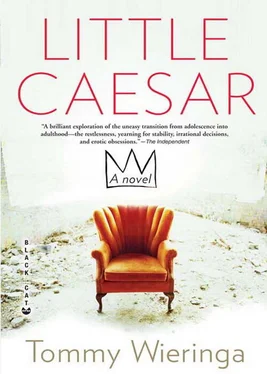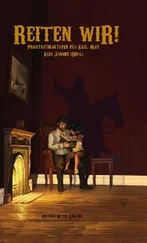‘It’s open season for pigeons, rabbits, hares, blackies and deer.’
‘Blackies, Norvie?’
‘Pakis, wogs. . I’m no racist, mind you, I just can’t stand the blackies.’
I will not bat an eyelid when Selwyn asks me to take a photograph of him with that animal in his hand, the top of its body dangling by a few shreds from the rest. Gun smoke and a lacy mist hover between the trees and sometimes, when we step out into the open field and see on the horizon a row of Scots pine with flattened crowns, it’s like being on the savanna — Africa, just before the sun breaks through the clouds.
The tractor takes us to Bunyans Walk, the hill on the coast just north of Kings Ness. The erosion is eating the land away there as it is at our place, but more dramatically, taking heavy old trees down with it. When you look up from the beach you can see the web of roots clutching naked and panicky at the yellow sand.
The forest seems to cringe when we enter. We work our way in a long line through dead brown ferns, break off branches that get in the way. The men shoot at the bends in branches, someone shouts, ‘That’s no tree, that’s a hotel!’
A series of shots follows — loud, dry cracks and an explosion of activity amid the leaves and branches on high. I cover my ears and see Selwyn smile.
‘There!’ a man screams at the tenth squirrel.
The animal hides on the side of the trunk where we’re not. The men circle the tree and keep firing until they hit it. The squirrel is stuck between two branches, its head hanging, blood dripping onto the forest floor. Selwyn’s father shoots a jay, someone else kills a woodcock, others magpies and a pair of grey squirrels. We move on in a long row towards the edge of the cliff, a roebuck bursts through our lines. In the surf ahead bobs a heavy tree trunk, the kind you find on the beach sometimes, soaked and heavy as lead, who knows how long it’s been floating across the oceans.
We leave Bunyans Walk to the south, moving into the reed flats that separate the hill from Kings Ness. The reeds grow here behind a sort of dyke of sand through which the sea breaks at times. In the pale light of the February sun, the reed stems look like a million strokes of a single-haired brush. A slow, fluid shiver spreads across the flats, an invisible hand petting a cat’s back. Here amid the reed is where the barking Chinese water deer, muntjacs, hide, another exotic species. At dusk, when I walk the secret paths through the reeds (I know the hidden thatchers’ spots, I know where the poaching goes on), I’m sometimes startled half to death when one of them suddenly goes racing off. I’ve never actually seen one, but you can hear them splashing away for the longest time. In China they think the muntjac has magic powers, because of its lightning speed.
Selwyn asks if I’d like to shoot some; I don’t feel like it much, but I let him hand me the gun. I turn to face the wood’s edge, and he points to a crow’s nest in an oak tree. I aim and shoot, but hit only branches. Shrugging, I hand the rifle back to him — not cut out for it, see? In the distance, the game warden shouts that we’re moving on. We’re the last ones to the trailer, where they’re smoking and talking about a bachelor party in Amsterdam.
‘All you need’s a pair of clean shorts and a suitcase full of condoms, hahaha!’
The undisputed highpoint of the trip was when the groom-to-be ate a peeled banana from a Thai cunt. Selwyn’s father says they should keep their filthy talk to themselves, there are young people about, but he laughs too loudly for anyone to believe him.
The decisive story, the one in which Selwyn played a role, took place in late winter. It had been foggy for days. Going outside in the morning on my way to school, the wet, gray dampness would seep into my clothes and finally into my head as well. After seeing nothing but diffuse gray for days on end, you start to feel like you’ve turned into fog yourself. I wrote little notes to myself, things like We have been in the mist now for six days; whether anything is still alive outside this we do not know . Sometimes, when you heard a plane flying overhead, you knew the world had not yet come to an end. The sea could not be seen, only the surf could be heard. The window was a blind square, luminescent as a picture screen.
One ash-gray afternoon I was out looking for amber amid the thick gravel on the beach by Bunyans Walk. I could see little more than the stones beneath my feet. The mist was blowing around me in tatters. In the distance I saw a phantom approaching, a tenuous, shivering pillar. Slowly it changed into a human, into Selwyn with the family dog, once they came close enough. But without the friendliness. I had noticed it in the canteen recently as well, something was weighing on him. And it had to do with me. Out of sight now, the German shepherd sniffed and growled.
‘Kaiser!’ Selwyn shouted.
The dog appeared from the mist. It jumped up against me and left sandy footprints on my trousers and coat.
‘So are you going to tell me about it?’ I asked.
‘What?’
‘About what’s up.’
He peered into the fog. Then he said I should come to his house at three. I stared at his back until he dissolved.
A little later I climbed the path to Kings Ness. The field to my right had been recently plowed, the soil was gleaming. Further up the fog turned thin and yellowy, above it at last the sun was shining. I heard the jubilant song of a lark, but the pounding in my chest was produced by a sense of impending calamity.
I arrived at three o’clock sharp. Selwyn led me into the TV room. He pointed to a chair. From beneath his jumper he then pulled out a videotape, without the box. He slid the tape into the recorder, the television jumped of its own accord to AV.
‘This is what I want to show you,’ he said with his back to me. ‘My brother came home with it.’
A metallic-sounding jingle, the logo of a film company, warnings concerning the unauthorized screening and reproduction of the material, then the first images. A landscape somewhere in Southeast Asia, the camera panned over a bay by morning, canoes being poled along by standing fishermen in reed hats, then across a beach to the patio of a villa on a green hill. A company of Caucasians, colonial and bored. The camera’s eye rested on the individual players. This was where the cast of characters was pointed out, who mattered and who would remain unimportant. It zoomed in on a young woman holding a cigarette between her long fingers. She exhaled a thin stream of smoke. The smoke curled into the title of the film, LILITH, then the letters faded into butterflies and hummingbirds that flew off screen one by one. We were back at the beautiful young woman — in whom by then I had recognized my mother. Or rather, a woman who resembled her to a tee, an extremely young version of her. She was Lilith. I edged up to the TV to get a closer look, but behind me Selwyn had pressed the fast-forward button and events were rushing past at a baffling speed. Men, women, intrigues and searching looks, the villa amid the dark green hills, a swimming pool and a hairy-chested man in a loincloth. .
‘Stop the film!’ I shrieked.
And there she was again, at the edge of the pool, resting languorously on a divan. I knew that body, it had figured in my erotic fantasies. Now there it was beside a swimming pool in god-knows-where, and that guy with the loincloth was up to something — you could see his cock plainly behind the fabric. She didn’t react, only lay there challenging the gods stoically, a pair of large black sunglasses on the bridge of her nose. He said something to her about the temperature of the pool. She said there was nothing wrong with it. Things began picking up a bit after that, when the man said, ‘Now that you’ve gone to bed with Richard. .’
Читать дальше












